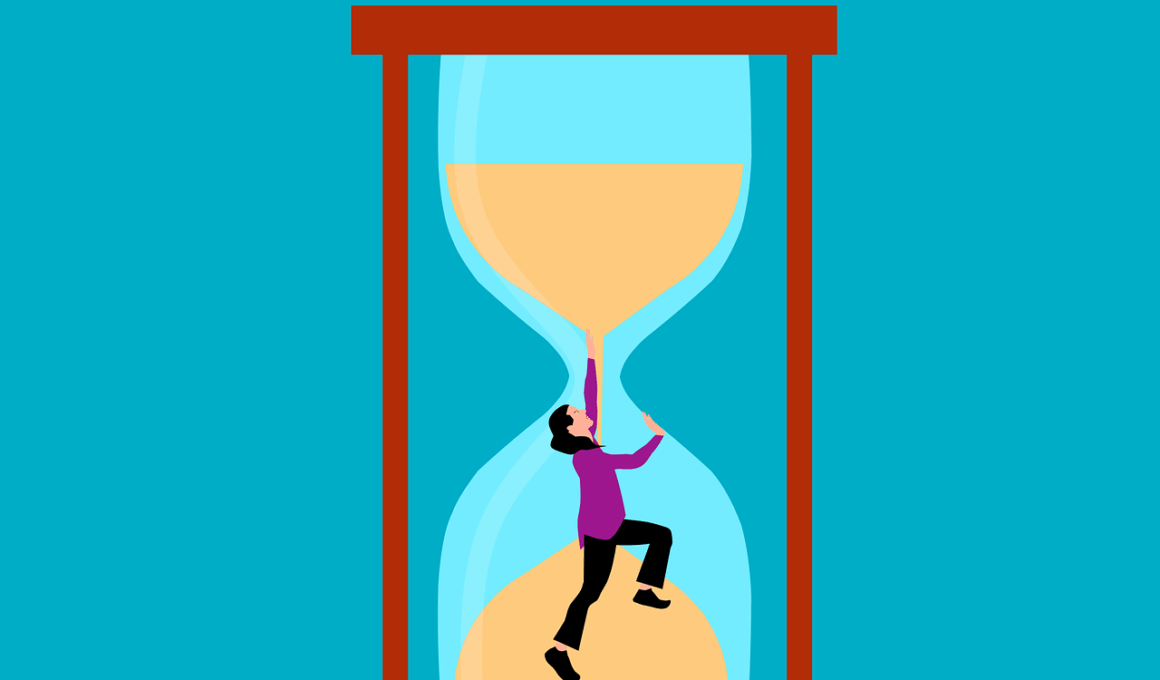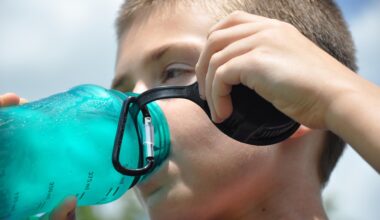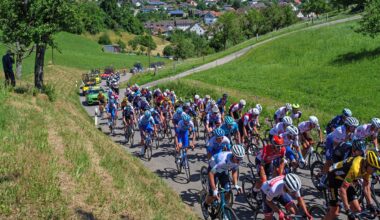Developing Pre-Competition Routines
In the realm of sports psychology, managing stress is crucial for athletes seeking peak performance. One effective method to regulate stress levels involves the creation of pre-competition routines. These routines serve as a psychological anchor, providing athletes with familiarity and security. By establishing a consistent sequence of actions before competitions, athletes can significantly enhance their focus and mental clarity. This structured approach not only minimizes anxiety but also allows for decreased mental fatigue. Furthermore, routines can integrate mental strategies such as visualization and positive self-talk. By mentally rehearsing their performance before heading on the field, athletes feel more prepared and confident. Moreover, pre-competition routines may include physical warm-ups that help elicit a state of readiness. Another aspect to consider is the impact of environmental factors on performance. Athletes must also select specific locations that promote a calm atmosphere. These pre-competition rituals are unique to each athlete; thus, personal customization is key. Ultimately, a cultivated routine builds resilience against stress, enabling athletes to reach optimal performance. Ultimately, the establishment of these pre-competition routines lays the foundation for successful competition outcomes. Engaging with these practices can lead to a healthier relationship with competition.
Understanding the significance of pre-competition routines is imperative for athletes. Many individuals underestimate how important preparation is in sports psychology, especially concerning stress management. When athletes consistently practice their routines, they develop muscle memory that plays a role in calming nerves and enhancing performance. Specifically, routines facilitate a state of psychological flow, which is essential for optimal athletic functioning. Athletes can reduce uncertainty by following a predictable process, allowing their minds to concentrate fully on the competition ahead. Stress often arises from worrying about performance outcomes, but routines can mitigate these fears. They serve as reminders of past successes, reinforcing self-confidence. The power of routine lies in its ability to restore focus and clarity amidst the chaos of competition. Moreover, athletes can incorporate breathing exercises into their routines, contributing to relaxation. Slow, deep breaths stimulate the parasympathetic nervous system, reducing heart rate and calming anxiety. Regular practice of such breathing techniques can be invaluable. Additionally, integrating healthy nutrition before competition can aid in maintaining energy levels, supporting physical performance. As athletes become more prominent within their routines, they empower themselves to combat performance anxiety more effectively.
Choosing Effective Components for Your Routine
When developing a pre-competition routine, selecting effective components is essential. Personalization plays a critical role; athletes should include elements that resonate with them emotionally and mentally. Incorporating calming visualizations or affirmations can help anchor the athlete’s mindset positively. Equally important is the timing of the routines; they should start at least an hour before competition to ensure maximum mental priming. Athletes might consider warming up or stretching as physical components to include in their routines since physical readiness aids in overcoming stress. Creating a mental checklist might prove beneficial as a means to maintain focus; athletes can mentally review their goals and expectations for the competition day. Another vital aspect is rehearsal; practicing these routines ahead of the event enables athletes to adapt them naturally into their performance schedule. Some athletes have found success in utilizing the same clothes or items for every competition, introducing a sense of comfort. Furthermore, connecting with teammates or coaches briefly may help reinforce group dynamics, alleviating individual stress through social support. By thoughtfully curating these routine elements, athletes can forge more robust pathways to elite performance even under pressure.
A vital consideration in these established routines is the significance of mental recovery periods. Stress management should not only focus on preparation but also on the post-competition phase. Athletes can benefit from taking time to reflect on their performances. Allowing oneself to acknowledge both successes and areas for improvement creates a balanced mindset. Furthermore, starting a journaling habit post-competition can aid in emotional regulation, allowing athletes to write down their feelings and experiences. Over time, this practice can lead to better awareness of stress triggers throughout the competition cycle. Engaging with a coach or mentor after competition can also serve as a constructive measure. These discussions can illuminate aspects of performance that went well and those that could be improved. Additionally, this follow-up strengthens the support network, which is essential for overall mental health. A supportive environment contributes positively to an athlete’s ability to cope with competition-induced stress. Reflection and feedback ultimately empower athletes to approach their next event with improved strategies and clarity. These post-event conversations, coupled with journaling, can enhance long-term growth and resilience.
The Influence of Consistency in Performance
Consistency plays a vital role in stress management through pre-competition routines. Athletes who engage in these structured rituals are often more successful in coping with the psychological demands of competition. Such routines instill a sense of reliability and predictability, which can ease tensions before events. As individuals rehearse these actions regularly, muscle memory combines with cognitive rehearsal, creating a holistic experience that promotes mental stability and performance confidence. Researchers in sports psychology have demonstrated that consistency leads to improved focus, as the body and mind align to expectations. Athletes can establish their own rhythm, fostering a performance mindset that allows them to concentrate on execution rather than worry about outcomes. The impact of consistency emerges during critical moments, where split-second decisions must be made under pressure. Relying on familiar routines enables quicker reflexes and improved cognitive processing. Moreover, these routines can create a baseline performance level, encouraging athletes to identify progress made over time. As athletes acknowledge their growth, self-efficacy increases, reducing anxiety. Therefore, the integration of consistent behaviors in pre-competition routines significantly affects how athletes manage their stress and achieve success.
In terms of practical application, athletes must commit to diligently maintaining their pre-competition routines. There is a need for discipline in forming these habits, as they might not yield immediate results. Establishing an effective routine necessitates trial and error, enabling athletes to discover what elements truly resonate with them. Adaptability is key; while consistency is essential, athletes must also respond to differing competition environments. Individual routines might require modification as a result of travel conditions or venue changes. Preparing to adapt ensures that the athlete can maintain comfort even amidst novel situations. Additionally, athletes may explore group routines alongside teammates; these collective practices can foster a sense of camaraderie and shared purpose. This mutual engagement can directly counteract feelings of isolation. Presenting a united front enables athletes to rely on one another, reinforcing the idea that they are not alone in their challenges. The bonds formed can also serve as motivation. Whether embracing personal routines or group strategies, the ultimate aim remains to reduce stress levels while enhancing overall performance. Every athlete must determine their unique methods, continuously refining them over time.
Evaluating Routine Effectiveness
Finally, regularly evaluating the effectiveness of pre-competition routines is essential for athlete development. Athletes need to reflect upon their routines following events, considering elements that worked and those that did not. This reflection should aim for objectivity, identifying specific triggers of anxiety or stress during competition quickly. Keeping a performance log that tracks routine adherence and results can provide insights into the effectiveness of each element. Over time, correlations can emerge between routine components and performance outcomes, allowing for targeted adjustments. Visualization exercises within in the routine may require more focus, or perhaps mindfulness techniques could see a greater role during warm-up activities. Furthermore, seeking external feedback from coaches or sports psychologists can facilitate growth during routine modifications. They can offer an outside perspective on which routine components are effective and which need reconsideration. Incorporating feedback enables athletes to have a more comprehensive view of their development journey. By fostering an environment of continuous improvements, athletes cultivate a resilient mindset that thrives under competition’s pressures. Overall, the journey of refining pre-competition routines represents a significant factor in athletes’ stress management.
In conclusion, developing effective pre-competition routines is essential for managing sports-related stress. These routines should incorporate physical and psychological elements that are personalized, fostering a sense of comfort and readiness. By engaging consistently with these practices, athletes can minimize the anxiety that frequently accompanies competition. As stress levels decrease, the likelihood of peak performance increases, enabling athletes to reach their true potential. The focus must remain on adaptability and personal reflection; routines should evolve based on individual experiences and observations. Psychological engagement proves vital, emphasizing visualization techniques and mindfulness practices alongside physical warm-up strategies. Athletes should acknowledge that the journey toward refining these routines is just as important as the competition itself. Collaboration within teams enhances this journey, fostering camaraderie and shared experiences. Coaches and psychologists play indispensable roles in cultivating these environments, providing support and objective feedback. As athletes navigate their paths, the insights gained from routine evaluations can contribute significantly to their development. In essence, effective management of stress through pre-competition routines establishes a foundation for long-lasting success and resilience, allowing athletes to navigate and thrive in competitive arenas.


